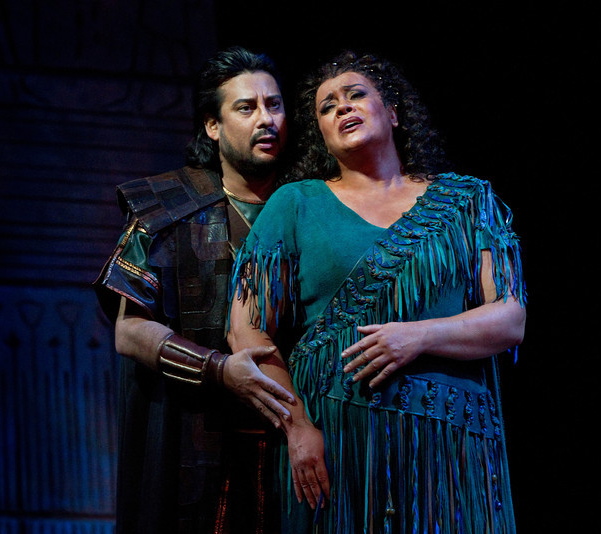Variable singing and empty spectacle make for a less-than-stellar Met “Aida”

Marcelo Álvarez and Violeta Urmana star in the Metropolitan Opera production of Verdi's "Aida" Photo: Marty Sohl
There are times when one almost thinks that some operas need to be sent into hibernation—not because they are flawed or unworthy, but because contemporary singers and producers seem to have no clue what to make of them. Into this category one might put all of Wagner’s works, now largely bellowed rather than sung with the satiny legato that the composer admired; Bizet’s Carmen, perhaps the most sinned-against opera of all given today’s dearth of French stylists; and Verdi’s Aida, which suffered a shambolic revival at the Metropolitan Opera on Thursday night.
To compare Sonja Frisell’s 1988 production (now directed by Stephen Pickover) to a Cecil B. DeMille extravaganza is to accord it undue dignity. Aida begins with gentle, iridescent strings and ends with a woman’s whispered prayer for peace. It is at heart an intimate opera, a series of fraught and wrenching encounters between individuals. Its ceremonial scenes and their militaristic claptrap express Verdi’s distaste for all that is triumphalist and authoritarian.
In spite of that, the Met’s Aida served up brainless pageantry and spectacle in place of dramatic substance. The characters most often directed their pleas and imprecations not to each other but to the gallery. The audience guffawed when the king of Egypt awarded the hand of Amneris to the warrior Radamès. The Met dancers performed Alexei Ratmansky’s choreography valiantly but could not compensate for its King Tut kitsch. And what hoedown is complete without horses? One white steed was having none of the Triumphal Scene, fussing and threatening to bolt. Verdi once said that he preferred quadrupeds to humans for their guileless hearts; that splendid creature at the Met deserved praise for its aesthetic discernment, as well.
The vocal honors were shared by Jordan Bisch as the king and Stephanie Blythe as Amneris. In the midst of much shrieking and shouting, Bisch simply and blessedly sang. His handsome basso was burnished and firm, he uttered the text with clarity, and he shaped his music with all the dignity and authority befitting a monarch.
A very few uncertain phrases aside, mostly in the extreme upper reaches of the role, Blythe was a magnificent Amneris. Sumptuous tone, a dynamic range ranging from a luminous pianissimo to grand, clarion phrases that seem to reach out and embrace everyone in the auditorium: audiences have come to take these things for granted from Blythe. No less remarkable were the telling touches in her dramatic portrayal: the radiance on her face as Amneris entered to be blessed for her wedding, the precarious calm with which she confronted Radamès in the trial scene. Blythe’s singing and artistry, at least, were fully worthy of Verdi.
As Radamès, Marcelo Álvarez did some rapturously beautiful singing in the opera’s final scene, his tone soft and tender as he and the death-besotted Aida awaited their end. It was unfortunate that the curtain was brought down a good ten seconds too soon, destroying one of the few moments of magic in a grimly prosaic evening. It was unfortunate, too, that Álvarez had been so inconsistent in the hours leading up to those last ten minutes, alternating bleats and hollers with phrases of velvety, ingratiating beauty.
Her eyes downcast, her lovely face veiled in sadness, Violeta Urmana made a touching entry. Her portrayal of Aida (admittedly not one of Verdi’s most compelling heroines) never really grew beyond that, and she sang well only in the middle and lower reaches of the role, her voice failing altogether in the stretta of the Act III duet with Radamès. As her father Amonasro, Lado Antaneli indulged in a fair bit of semaphore-style mugging and plied his dark, imposing tone without distinction.
James Morris was in remarkably fresh voice as Ramfis; Adam Laurence Herskowitz as the messenger and Lori Guilbeau as the priestess both sang well. The men of the Metropolitan Opera Chorus under Donald Palumbo created sounds of thrilling, otherworldly mystery in the temple scene. Marco Armiliato led powerful and vigorous readings of the prelude and dance music but seemed otherwise incapable of imposing order on this weak and untidy Aida.
Aida runs through March 3, with Marcello Giordani scheduled to portray Radamès in later performances. metoperafamily.org; 212-362-6000.
Posted Feb 10, 2012 at 2:55 pm by david walker-price
I was not present at this performance but listened to it live on Sirius and my impression was very similar to this reviewer (sorry I didnt get to see the horse.
I have heared Urmana in this role and find her voice and singing unremakable. Alvarez’ singing did sound patchy and inconsistant over the radio.But with the exception of James Morris who was in his current best voice and Blythe -a true force of nature – there was little beautiful singing,musicallity or syle.Singers they maybe but artists…hmmmm.
Posted Feb 10, 2012 at 5:14 pm by lotta
I tuned in at the beginning and had a sense of foreboding that the above would be true and tuned out. If it doesn’t grab you right away then what’s the point?
Posted Feb 11, 2012 at 11:13 am by david walker-price
Some times an inauspicious opening can be a case of singers settling , in at other times one has a sinking feeling that its going to be a struggle for performers and audience alike……this is the pain and pleasure of live theatre.The recent Sirius broadcast of Ernani shows what can happen on a good,maybe great, night.I hope its as glorious on the 18th. when Im in the house.